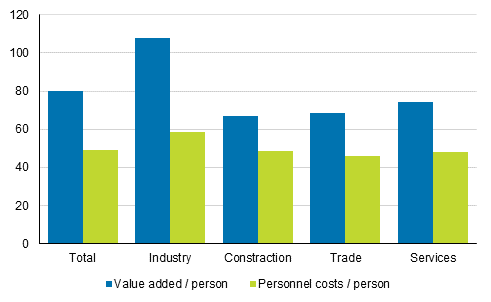Published: 19 December 2019
Personnel costs comprised 62 per cent of the value added generated by enterprises in 2018
Enterprises’ (TOL B to S, excl. K) total value added was EUR 112.2 billion. EUR 2.8 billion more value added was generated than in the year before. Wages and salaries and other personnel expenses amounted to EUR 69.3 billion. Thus, the ratio between the value added and personnel costs, i.e. real productivity was 1.6 in 2018. The value added generated by enterprises was EUR 80,000 per person. Correspondingly, personnel costs paid per person amounted to EUR 49,000. These data derive from Statistics Finland’s Structural business and financial statement statistics.
Enterprises’ value added and personnel costs per person in 2018

Examined by main industry, the production efficiency of total industries (TOL B to E) is in a class of it own. In 2018, manufacturing enterprises generated EUR 108,000 in value added per person and, correspondingly, they paid EUR 58,000 in personnel expenses per person. In other main industries the annual value added generated by one person was on average EUR 67,000 to 73,000 and personnel expenses EUR 46,000 to 49,000 per person.
Number of personnel of enterprises increased in 2018
There were 360,800 enterprises in 2018. The number of enterprises decreased by around one per cent from 2017. The number of enterprises increased most in real estate activities (industry 68) and decreased most in the forest industry (industry 02).
The number of personnel in enterprises grew by around 43,000 staff-years (3%) in 2018. The combined number of personnel was 1.5 million converted into full-time employees. The number of personnel increased most in the industries of construction of buildings, and employment activities (industries 41 and 78). The annual change in construction of buildings and employment activities was nine per cent. The number of personnel decreased most in civil engineering, and warehousing and support activities for transportation (industries 42 and 52).
The number of personnel grew in enterprises with a higher number of employees but decreases in smaller enterprises. In enterprises classified as micro enterprises, the total number of personnel declined by around two per cent.
The data are based on the Tax Administration’s taxation data. The data are supplemented with Statistics Finland's own inquiries. The data presented in this release are based on enterprise units. In addition, financial statement data based on legal units (Business IDs) are still available from the Structural business and financial statement statistics.
Source: Statistics Finland
Inquiries: Rauno Viita 029 551 3381, Jyri Järvinen 029 551 3562, rakenne.tilastot@stat.fi
Director in charge: Mari Ylä-Jarkko
Publication in pdf-format (210.1 kB)
- Tables
-
Tables in databases
Pick the data you need into tables, view the data as graphs, or download the data for your use.
Appendix tables
- Revisions in these statistics
-
- Revisions in these statistics (19.12.2019)
Updated 19.12.2019
Official Statistics of Finland (OSF):
Structural business and financial statement statistics [e-publication].
ISSN=2342-6233. 2018. Helsinki: Statistics Finland [referred: 15.2.2026].
Access method: http://stat.fi/til/yrti/2018/yrti_2018_2019-12-19_tie_001_en.html

